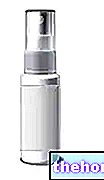Halitosis, synonymous with bad breath, is a condition characterized by the emission of unpleasant odors through the respiratory act.
Causes
For further information: Causes of Halitosis
Halitosis and Mouth Health

More often, however, halitosis reflects a local problem; decayed or pyorrhea teeth, as well as poor oral hygiene, are often associated with halitosis.
This unpleasant symptom is caused by the interdental stagnation of food residues degraded by plaque bacteria; a decayed tooth, for example, can turn into a small reservoir of food debris, which like all decaying organic substances produce bad odors. Fortunately, saliva and sips of water help to clean the teeth and the oral cavity, removing both food residues and bacteria; on the other hand, sleeping at night decreases salivary flow and this explains, at least in part, why bad breath is particularly common upon awakening and in smokers (smoking, in addition to containing substances that give the breath an unpleasant odor, promotes dry mouth).
Curiosity: Why does your breath smell bad as soon as you wake up? "
Halitosis and Diseases
The typical halitosis of rhino-pharyngeal infections (rhinitis, sinusitis, pharyngitis) and of some lung diseases (bronchiectasis, lung abscess) is due to the presence of mucopurulent and necrotic material. Bad breath can also be an expression of an advanced liver disease , and in this case it assumes a fish-like odor (ammonia halitosis), or renal insufficiency (when it resembles that of urine); the fruity exhalations of diabetic ketoacidosis are more pleasant.
Taking certain medications, such as certain antibiotics, can also give your breath an unpleasant odor.
In-depth articles
Cures and Remedies
Importance of Oral Hygiene
To prevent and combat halitosis, careful oral hygiene is essential; only the scrupulous cleaning of the teeth with a brush, dental floss and abundant rinses (possibly flavored), ensures a deep removal of food residues, removing bad breath.
This concept should be clear to many people who attribute their halitosis to gastric problems (stomach acid, difficult digestions, etc.), without knowing that these disorders actually play a marginal or even no role.
We must not forget that the esophagus is closed at its ends by two muscle rings, which open only to allow the passage of food, belching and vomiting. The incontinence of the lower ring, typical of gastroesophageal reflux, can however be accompanied by frequent belching and rising of acidic material in the esophagus, giving the breath an unpleasant odor.
Proper tongue cleaning also plays a key role in fighting halitosis.
Other Remedies
For further information: Remedies for Halitosis
In the presence of halitosis, if the pathologies listed in the last paragraph can be excluded, it is important to go to the dentist to exclude unhealthy states of the oral cavity and possibly remedy them.
In the absence of pathological conditions of a local nature, the dentist himself will recommend a series of remedies to combat halitosis. The first, already mentioned, concerns compliance with simple hygiene rules, amply illustrated in the article: caries and oral hygiene.
Secondly, he can recommend mouthwashes and preparations for rinsing and gargling with antiseptic and covering action (among the most used are those based on mint and menthol, parsley, fennel, rosemary, coriander and eucalyptus).
Curiosity: Mouthwashes: effective against halitosis? "
















.jpg)











